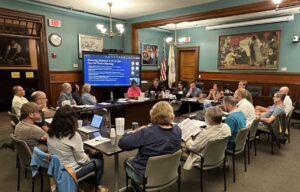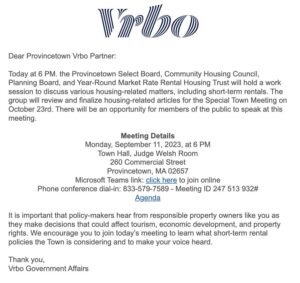PROVINCETOWN — Eight of the 15 warrant articles being prepared for an Oct. 23 special town meeting are related to the town’s ongoing housing crisis. They include a $2-million purchase of land on Nelson Avenue and two proposals to regulate short-term rentals.

At a four-committee housing workshop on Monday, Sept. 11, the select board, planning board, community housing council, and Year-Round Market-Rate Rental Housing Trust reviewed those eight articles, focusing on short-term rental regulation and the proposed removal of a mandatory deed restriction from the town’s accessory dwelling unit bylaw.
“The impetus for the special town meeting was that the select board negotiated the purchase of two privately owned parcels, 22 and 24 Nelson Ave., for future housing development,” said Town Manager Alex Morse. That $2,035,000 purchase must be approved by town meeting voters; it currently appears as Article 9 on the draft warrant.
Because a town meeting was needed, Morse said, “We thought it would be appropriate to take the low-hanging fruit where there was obvious consensus at the last housing workshop and turn those into articles for the special town meeting.”
Those measures included a ban on corporate ownership of short-term rental properties and a new limitation on how many short-term rental certificates any one person may hold.
The corporate ownership ban, currently Article 12 in the warrant, would still allow LLCs, trusts, and S corporations to hold short-term rental certificates as long as every partner or member of the entity is a real person whose identity is documented at town hall.
The draft text of Article 13 is nearly identical to that of Article 12, but it adds a provision that limits each person to holding two short-term rental certificates. All existing short-term rental certificates would be “grandfathered in,” Morse said, even for people who hold more than two.
“There’s no proposal at the table to take away people’s short-term rental certificates or to ban short-term rentals altogether,” Morse said. “When we surveyed all the members of these four boards, there was zero interest in banning short-term rentals.”
“The vast majority of people in town who have short-term rentals only have one certificate,” said Assistant Town Manager Dan Riviello.
“When we start with these two short-term rental regulations, it’s a little bit of a value statement,” Riviello said. “Then we work on the incentives” to rent year-round, which could appear on the spring town meeting warrant.
“I think it’s important to say we’re not looking at an overall cap right now,” Riviello added. “There was a lot of contention over whether that’s limiting people’s future ability to do something once we reach that cap.”
Members of the four boards were largely comfortable with both Articles 12 and 13, and discussion centered on how to combat misinformation about them.
Five people who spoke in public comments before the meeting began had warned the boards not to pursue short-term rental regulations.
“So much of this housing discussion seems like an ‘us versus them’ fight,” said Alan Roth, who urged the boards instead to construct more rental housing and streamline the town’s permitting process.
“I’m concerned that my ability to rent short-term is going to be limited or eliminated,” said Melissa Falen. She said that would force her to sell her property, probably to someone who could afford to leave it empty. “For the first time since 2012, I’ve started thinking of where else I might like to retire,” Falen said.
“An email went out to a large group of people saying we’re all coming for your short-term rentals,” said select board member Leslie Sandberg. “We’re not. We’re really not.”
“Some of the public comments were a preview of this misunderstanding,” said Morse. Sandberg called it “misinformation.”
The Independent reviewed copies of the email to which Sandberg was referring. It came from Pat Miller, president of the Provincetown Part-Time Resident Taxpayers Association. “The push is to stop you from using your property for rentals,” Miller wrote on Aug. 31.
Planning board member Michael Gaucher said the international short-term rental platform VRBO.com had also sent a message to its rental hosts in Provincetown. “We need to speak to people who are getting information from much larger and more well-resourced sources,” said Gaucher.
A message from “VRBO Government Affairs” to “Provincetown VRBO partners” had been posted on social media by Provincetown Board of Health chair Steve Katsurinis.

“It is important that policymakers hear from responsible property owners like you as they make decisions that could affect tourism, economic development, and property rights,” the VRBO message said. “We encourage you to join today’s meeting to learn what short-term rental policies the Town is considering and to make your voice heard.”
“As I said at the last workshop, regardless of what we do, for some it will be too much and for others it won’t be enough,” said Morse. “Certainly we’ll do our part between now and special town meeting.”
Accessory Dwelling Units
The only significant disagreement at the workshop was over the draft version of Article 15, which would remove a provision from the town’s bylaws that requires new accessory dwelling units (ADUs) be deed-restricted to year-round rental only.
Article 15 would strike the deed restriction and replace it with two looser conditions: that an ADU not be used as a short-term rental, and that it not be converted into a condominium unit or sold separately from the main property.
Select board chair Dave Abramson said that summer-sharing arrangements could be used to skirt the short-term rental rule, and that new ADUs might still go to vacationers instead of working people.
Planning board chair Dana Masterpolo said that the existing bylaw had produced only one ADU, and that even if not all new units were used as the town’s leaders might hope, some fraction of those new units would be better than none at all.
Select board member Austin Miller agreed and said that restrictions on development that limit the supply of units had helped put vacation rentals and year-round rentals into conflict in the first place.
Morse said that the town could also explore incentives to help ensure that at least some of the new ADUs become year-round rentals.
“There could be ways in which you only have access to these programs or incentives if you rent year-round,” Morse said. “I don’t think those are things we necessarily can legislate in the general bylaw, but there are things we can do separately.”
No changes were made to the Article 15 draft. The select board will hold a public hearing on the town meeting articles on Oct. 10, and the planning board will hold a hearing on Oct. 12.
The voter registration deadline for the Oct. 23 town meeting is Friday, Oct. 13 at noon.



